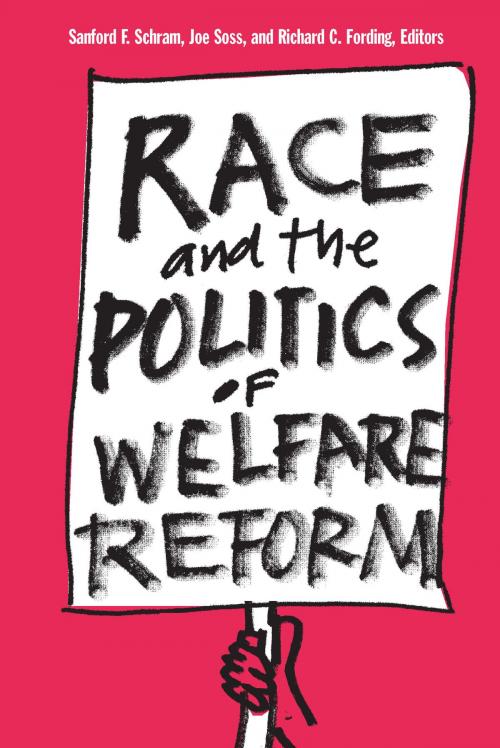Race and the Politics of Welfare Reform
Nonfiction, Social & Cultural Studies, Social Science, Cultural Studies, African-American Studies, History, Americas, United States, Political Science| Author: | ISBN: | 9780472025510 | |
| Publisher: | University of Michigan Press | Publication: | March 10, 2010 |
| Imprint: | University of Michigan Press | Language: | English |
| Author: | |
| ISBN: | 9780472025510 |
| Publisher: | University of Michigan Press |
| Publication: | March 10, 2010 |
| Imprint: | University of Michigan Press |
| Language: | English |
It's hard to imagine discussing welfare policy without discussing race, yet all too often this uncomfortable factor is avoided or simply ignored. Sometimes the relationship between welfare and race is treated as so self-evident as to need no further attention; equally often, race in the context of welfare is glossed over, lest it raise hard questions about racism in American society as a whole. Either way, ducking the issue misrepresents the facts and misleads the public and policy-makers alike.
Many scholars have addressed specific aspects of this subject, but until now there has been no single integrated overview. Race and the Politics of Welfare Reform is designed to fill this need and provide a forum for a range of voices and perspectives that reaffirm the key role race has played--and continues to play--in our approach to poverty.
The essays collected here offer a systematic, step-by-step approach to the issue. Part 1 traces the evolution of welfare from the 1930s to the sweeping Clinton-era reforms, providing a historical context within which to consider today's attitudes and strategies. Part 2 looks at media representation and public perception, observing, for instance, that although blacks accounted for only about one-third of America's poor from 1967 to 1992, they featured in nearly two-thirds of news stories on poverty, a bias inevitably reflected in public attitudes. Part 3 discusses public discourse, asking questions like "Whose voices get heard and why?" and "What does 'race' mean to different constituencies?" For although "old-fashioned" racism has been replaced by euphemism, many of the same underlying prejudices still drive welfare debates--and indeed are all the more pernicious for being unspoken. Part 4 examines policy choices and implementation, showing how even the best-intentioned reform often simply displaces institutional inequities to the individual level--bias exercised case by case but no less discriminatory in effect. Part 5 explores the effects of welfare reform and the implications of transferring policy-making to the states, where local politics and increasing use of referendum balloting introduce new, often unpredictable concerns. Finally, Frances Fox Piven's concluding commentary, "Why Welfare Is Racist," offers a provocative response to the views expressed in the pages that have gone before--intended not as a "last word" but rather as the opening argument in an ongoing, necessary, and newly envisioned national debate.
Sanford Schram is Visiting Professor of Social Work and Social Research, Bryn Mawr Graduate School of Social Work and Social Research.
Joe Soss teaches in the Department of Government at the Graduate school of Public Affairs, American University, Washington, D.C.
Richard Fording is Associate Professor in the Department of Political Science, University of Kentucky.
It's hard to imagine discussing welfare policy without discussing race, yet all too often this uncomfortable factor is avoided or simply ignored. Sometimes the relationship between welfare and race is treated as so self-evident as to need no further attention; equally often, race in the context of welfare is glossed over, lest it raise hard questions about racism in American society as a whole. Either way, ducking the issue misrepresents the facts and misleads the public and policy-makers alike.
Many scholars have addressed specific aspects of this subject, but until now there has been no single integrated overview. Race and the Politics of Welfare Reform is designed to fill this need and provide a forum for a range of voices and perspectives that reaffirm the key role race has played--and continues to play--in our approach to poverty.
The essays collected here offer a systematic, step-by-step approach to the issue. Part 1 traces the evolution of welfare from the 1930s to the sweeping Clinton-era reforms, providing a historical context within which to consider today's attitudes and strategies. Part 2 looks at media representation and public perception, observing, for instance, that although blacks accounted for only about one-third of America's poor from 1967 to 1992, they featured in nearly two-thirds of news stories on poverty, a bias inevitably reflected in public attitudes. Part 3 discusses public discourse, asking questions like "Whose voices get heard and why?" and "What does 'race' mean to different constituencies?" For although "old-fashioned" racism has been replaced by euphemism, many of the same underlying prejudices still drive welfare debates--and indeed are all the more pernicious for being unspoken. Part 4 examines policy choices and implementation, showing how even the best-intentioned reform often simply displaces institutional inequities to the individual level--bias exercised case by case but no less discriminatory in effect. Part 5 explores the effects of welfare reform and the implications of transferring policy-making to the states, where local politics and increasing use of referendum balloting introduce new, often unpredictable concerns. Finally, Frances Fox Piven's concluding commentary, "Why Welfare Is Racist," offers a provocative response to the views expressed in the pages that have gone before--intended not as a "last word" but rather as the opening argument in an ongoing, necessary, and newly envisioned national debate.
Sanford Schram is Visiting Professor of Social Work and Social Research, Bryn Mawr Graduate School of Social Work and Social Research.
Joe Soss teaches in the Department of Government at the Graduate school of Public Affairs, American University, Washington, D.C.
Richard Fording is Associate Professor in the Department of Political Science, University of Kentucky.















